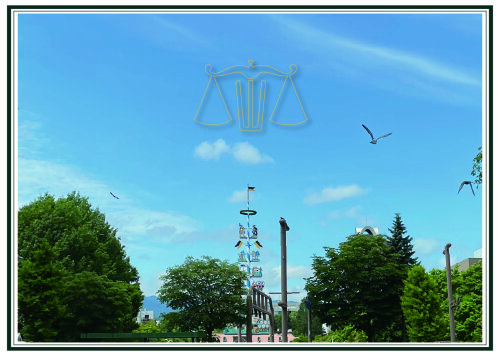Best Pension Lawyers in Sapporo
Share your needs with us, get contacted by law firms.
Free. Takes 2 min.
List of the best lawyers in Sapporo, Japan
About Pension Law in Sapporo, Japan
Pension law in Sapporo, Japan, is primarily governed by national legislation, as the pension system is largely uniform throughout the country. In Japan, there are various types of pension systems designed to support individuals in their old age, with disabilities, or in the case of the death of a family breadwinner. These include the National Pension, Employees' Pension Insurance, and Mutual Aid Pensions for public servants. Contributions, eligibility, benefits, and other specifics depending on the type of pension system the individual is a part of. It's important for residents of Sapporo to understand how these national laws apply to them locally.
Why You May Need a Lawyer
While the pension system in Japan aims to provide financial security, there are situations where legal issues may arise. Some common reasons you might need a pension lawyer include disputes over pension benefits, confusion about eligibility after a change in employment status, or challenges in navigating international pension issues if you have worked both inside and outside of Japan. A lawyer can also help with appeals against decisions made by pension authorities or with planning your estate to manage pension benefits effectively.
Local Laws Overview
Although pension law is nationally regulated, local variations, such as the implementation by municipal offices, may occur. In Sapporo, as part of the Hokkaido Prefecture, certain initiatives or additional supports may be in place for the elderly or disabled. Key aspects of pension-related laws include:
- Contribution requirements for different types of pensions, such as the National Pension Scheme (Kokumin Nenkin).
- Benefit calculations based on age, salary history, and contribution duration.
- Eligibility for pension benefits, which can depend on various factors such as years of contribution and citizenship status.
- Procedures for claiming pension benefits and the necessary documentation required.
Frequently Asked Questions
How do I enroll in the Japanese pension system?
All residents of Japan aged 20 to 59, including foreign residents, are required to enroll in the National Pension System. Enrollment is typically processed through municipal offices or employers for the Employees' Pension Insurance.
What happens to my pension if I move away from Sapporo or Japan?
Your pension contributions can typically be transferred, or you may be eligible for a lump-sum withdrawal payment if you leave Japan before pension age. It’s advised to consult a pension lawyer or the Japan Pension Service for specific guidance.
How much will I receive from my pension?
The amount of pension you receive depends on your contribution history, the type of pension you qualify for, and other factors such as additional contributions. A local pension advisor can help you calculate your expected benefits.
Is there an age requirement for receiving a pension?
Yes, the standard pension age is 65, but there are options for early or delayed pension benefits that affect the monthly payment amount.
Can I receive pension benefits if I'm self-employed?
Self-employed individuals are covered under the National Pension System and must make contributions to receive benefits in the future.
How do I challenge a pension decision?
If you disagree with a pension decision, you can file a claim for reassessment. If you are still dissatisfied, you might consider taking legal action with the help of a lawyer.
Can I opt-out of the Japanese pension system?
As a social insurance system, opting out is not generally possible for residents who meet the age and residency criteria.
What is the difference between the National Pension and Employees' Pension Insurance?
The National Pension (Kokumin Nenkin) is designed for all residents, including the self-employed, whereas the Employees' Pension Insurance (Kousei Nenkin) is for company employees and offers additional benefits based on salary and service length.
What documentation is needed to apply for a pension?
Typically, you will need identification, proof of age, contribution records, and other personal information. Your local municipal office can provide a detailed list.
Do foreigners in Sapporo have different pension rights?
Foreign residents with valid visas are required to contribute to the pension system and have the same rights to pension benefits as Japanese citizens, following the same rules and regulations.
Additional Resources
For further assistance with pension-related matters, you can contact the Japan Pension Service, municipal offices for local inquiries, or reach out to organizations that specialize in social security and pension consulting for international residents. Local legal services and nonprofit organizations may also provide assistance and educational workshops related to pension law and rights.
Next Steps
If you require legal assistance regarding pension in Sapporo, the next step would be to consult with a qualified pension lawyer or legal advisor who is knowledgeable about the Japanese pension system. They can provide personalized advice, help navigate the legal system, and act on your behalf if necessary. Preparing documentation and a summary of your employment and residency history in Japan will be beneficial for your consultation.
Lawzana helps you find the best lawyers and law firms in Sapporo through a curated and pre-screened list of qualified legal professionals. Our platform offers rankings and detailed profiles of attorneys and law firms, allowing you to compare based on practice areas, including Pension, experience, and client feedback.
Each profile includes a description of the firm's areas of practice, client reviews, team members and partners, year of establishment, spoken languages, office locations, contact information, social media presence, and any published articles or resources. Most firms on our platform speak English and are experienced in both local and international legal matters.
Get a quote from top-rated law firms in Sapporo, Japan — quickly, securely, and without unnecessary hassle.
Disclaimer:
The information provided on this page is for general informational purposes only and does not constitute legal advice. While we strive to ensure the accuracy and relevance of the content, legal information may change over time, and interpretations of the law can vary. You should always consult with a qualified legal professional for advice specific to your situation.
We disclaim all liability for actions taken or not taken based on the content of this page. If you believe any information is incorrect or outdated, please contact us, and we will review and update it where appropriate.












